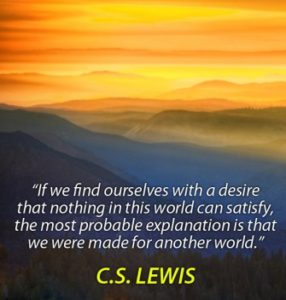Seeking Shalom: A Case For The Way Things Ought To Be
Sometimes defending God’s existence is easy. You don’t have to try to articulate some fancy philosophical or theological idea. And you don’t have to understand the intricacies of science. All you have to do is be a human being who observes the world in which we live. When you do that, there is no denying that something is drastically wrong. What we see around us is not the way things ought to be. Everybody from the most devoted religious believer to the most ardent atheist knows this. Our common human longing is for a world full of truth, justice, goodness, compassion, and charity. And while there are notable pockets of these things around us, they float in a sea of negativity and corruption.
The fact that everyone realizes this is proof of a powerful idea — that there must be some ideal kind of world we all wish we could experience. A place where things are the way they are supposed to be. And there is an old word the ancients used to describe a place like that. They called it Shalom.
Corrupted Culture
You don’t have to look hard to see a world gone mad. Just watch the news. Years ago we had a plot by eight-year-olds to kill their teacher. A Google search of that topic today produces several pages of results.
We have researchers who have combined genetic materials to produce human-monkey hybrids — because they can. We have others who seek to push that envelope even further.
And speaking of messing with what it means to be human, how about the growing trend of men “giving birth”? Yes, you read that correctly. Freddy McConnell had a baby in England! Freddy is not really a man, of course. This is not debatable. But we live in a society that condones and patronizes those who demand that we all pretend otherwise, while actual women suffer the consequences.
We see video of people whose organizations generate profits by selling the body parts of aborted babies. But the culture and the courts find more fault with the journalists who expose this practice than with those who engage in it.
A World Gone Bad
Our world is filled with sex trafficking, wars, serial killers, terrorists executing Christians, pornography, oppression, and abuse. Our politicians and news media outlets lie to us. And, maybe most discouragingly, many of our most prominent churches and pastors seem more intent on accommodating the cultural madness than critiquing it.
All of these things make us cringe. Some are uncomfortably bizarre at best, malevolently evil at worst.
But there is a common theme here. Each of these is an example of a way human beings have corrupted the world. We are moral creatures. And we cannot help but recognize, and suffer from, the ramifications of our bad moral choices. The world we see is a reflection of our human nature seeking its own ends.
Crooked Creatures
In the second book of his “Space Trilogy,” Perelandra, C. S. Lewis’s main character describes his encounter with an eldil — a term Lewis invented to describe something like what we might call an angel. When he first sees the eldil it appears to him as:
“… a very faint rod or pillar of light … [that was] not at right angles to the floor. But as soon as I have said this, I hasten to add that this way of putting it is a later reconstruction. What one actually felt at the moment was that the column of light was vertical but the floor was not horizontal – the whole room seemed to have heeled over as if it were on board ship. The impression, however produced, was that this creature had reference to some horizontal, to some whole system of directions, based outside the Earth, and that its mere presence imposed that alien system on me and abolished the terrestrial horizontal.”
Even though he couldn’t explain how, he could tell that the eldil was operating from some otherworldly frame of reference. And when compared to that, the Earth looked strangely crooked.
The Problem of Evil
In his own unique way, C. S. Lewis paints a picture of what we know innately. We recognize that our world is askew, even if we don’t know why. It’s the reason that the “problem of evil” is the most obvious — and most difficult — challenge to the existence of God. Those who doubt God’s existence point to the crooked, corrupted world and ask, “If there is a good God, and He created this world, how can it be such a mess?”
It’s a question that everyone — atheists included — asks. But the answer to that question doesn’t undermine the case for God’s existence at all. It actually does the opposite. We wouldn’t even be asking that question unless we had some intuition about its answer — some notion of a world gone right. But if God does not exist, there is no solution to this “problem” because there is no problem. The world is just the way it is and we suffer in a vacuum of meaningless indifference.
 What Do You Mean By “Ought”?
What Do You Mean By “Ought”?
The key is that everyone knows the world is “crooked” — that things are not the way they ought to be. When we say “ought,” we are acknowledging that there is an ideal kind of world in which everyone longs to live. Ought implies a standard of goodness — “a whole system of directions, based outside the Earth.” And that standard is moral perfection. It has to be.
God’s nature is that standard. And a world that reflects that standard is exactly the kind of world we long to inhabit.
If only we could find a place like that!
Shalom
In his book, Not The Way It’s Supposed To Be, Cornelius Plantinga, Jr. offers an insight that I have never forgotten about all this. He defines the Hebrew word shalom. If you’re like me, you may have seen that word translated, “peace.” But Plantinga goes into detail about why that simple definition of the word doesn’t cut it. Shalom is more than just “peace.”
“The webbing together of God, humans, and all creation in justice, fulfillment, and delight is what the Hebrew prophets call shalom. We call it peace, but it means far more than mere peace of mind or a cease-fire between enemies. In the Bible, shalom means universal flourishing, wholeness, and delight — a rich state of affairs in which the natural needs are satisfied and natural gifts fruitfully employed, a state of affairs that inspires joyful wonder as its Creator and Savior opens doors and welcomes the creatures in whom he delights. Shalom, in other words, is the way things ought to be.”
There was a time when we could have described the state of the world as shalom. But it didn’t last long. And when you’re living in a time like ours, shalom appears to be a phantom.
It’s not. It’s an ideal — a description of a place where every human being has always longed to live. And it’s a place that we will all be able to access again.
God Comes Down
God is a down-to-Earth kind of guy. He came down to Earth and took on human form once before. He experienced the pain and suffering of a world that is not the way it ought to be. But in doing so, He offered us a tangible foretaste of shalom.
And he’ll be back.
“Then I saw a new heaven and a new earth, for the first heaven and the first earth had passed away … I saw the Holy City, the new Jerusalem, coming down out of heaven from God, prepared as a bride beautifully dressed for her husband. And I heard a loud voice from the throne saying, ‘Now the dwelling of God is with men, and he will live with them. They will be his people, and God himself with be with them and be their God. He will wipe every tear from their eyes. There will be no more death or mourning or crying or pain, for the old order of things has passed away.'” ~ Revelation 21:1-4
Shalom.
Don’t be discouraged by the world. There are good ideas that long to be brought to fruition. And there are good people who strive to uphold and defend those ideas both now and in the future. But, more than either of those, there is a good God who is the Author of shalom. Though it sometimes seems elusive, there is a hope-filled time that’s coming for all who choose to seek it. And with that future comes a promise of shalom unlike anything we can even comprehend.


 What Do You Mean By “Ought”?
What Do You Mean By “Ought”?


